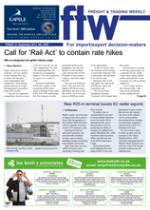South Africa must look to
institute a rail act, similar
to the National Port Act,
to make rail transport
more independent and
competitive, Peter Inman,
project director at Coega
Development Corporation,
told FTW recently.
“The port act engenders
competition, but do we have
a rail act? If we do, we can
start competition,” he said.
“We understand the cost
sensitivity of manganese
exports. If it’s too expensive
to export, it’s a waste of
time.”
Transnet Freight Rail
(TFR) has a policy of not
increasing tariffs much
above Consumer Price Index
(CPI), but FTW understands
that the company recently
increased tariffs on the
manganese line between
Hotazel in the Northern
Cape and the Port of Port
Elizabeth in the Eastern
Cape by more than triple
the CPI.
The rate was R280 per
tonne. This has now been
upped to R310 per tonne,
and before the year is out,
the tariff is set to increase
closer to R400 per tonne,
FTW understands.
“If this is correct, then
the Transnet tariff increase
is more than triple the CPI,”
a consultant, who declined
to be named, said.
However, this is still
way below the road tariff
of R780 per tonne, the
consultant said.
“So even at these
whopping increases,
Transnet is still cheaper than
the trucks.”
Government is currently
reviewing a green paper on
a national rail act, which
would more clearly define
public participation in new
structures, as well as private
initiatives.
“I see a major shift on
the Transnet side, with
more of an inclination
to have public-private
partnerships,” Iain Geldart,
managing director at Bulk
Connections, told FTW.
“There seems to be some
realisation that Transnet
cannot achieve what it needs
to on its own. I say the time
is absolutely right for publicprivate
initiatives,” Geldart
said.
Bulk Connections is
part of the Bidvest group,
and operates a wide range
of specialist material
handling facilities in SA.
In Durban it manages the
two bulk berths and its
terminal specialises in the
soft handling of all bulk
commodities, particularly
the loading of manganese,
coal and anthracite and the
offloading of coke.
This is in line with the
view of transport economist
Andrew Marsay, who
presented the case for a
privately run rail route
between Gauteng and
Durban in last week’s FTW
special feature on Gauteng.
Transnet’s aim is to
invest R300 billion in the
national rail network in a
drive to move cargo from
the road onto rail. The
company said its aim was to
do so as part of a seven-year
plan.
“We will do our best to
make sure everyone comes
on board with the right
cost,” Cleopatra Shiceka,
general manager at the
office of the CEO, Transnet,
said.
She indicated that
Transnet was indeed seeking
partnerships with private
companies, especially
where Transnet aimed to
create pick-up hubs for bulk
commodities like manganese
ore and ferro-alloys.
“Some mining
companies have smaller
parcels, others have bigger
ones,” she said. “We will
be looking at consolidation
of the parcels. We are
discussing that and working
on a model.”
Not every mine has its
own siding. Therefore
consolidation hubs make
good sense in a bid to
reduce costs and streamline
logisitics for the same
commodity, she said.
Call for ‘Rail Act’ to contain rate hikes
21 Sep 2012 - by Bianca Markram
0 Comments
FTW - 21 Sep 12

21 Sep 2012
21 Sep 2012
21 Sep 2012
21 Sep 2012
21 Sep 2012
21 Sep 2012
21 Sep 2012
Border Beat
16 Apr 2025
